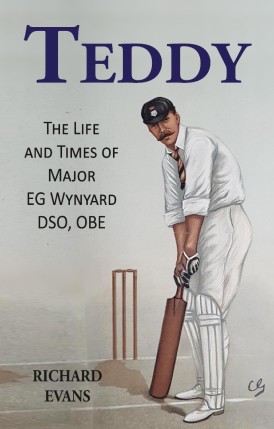Teddy
Martin Chandler |Published: 2018
Pages: 360
Author: Evans, Richard
Publisher: Chequered Flag
Rating: 3.5 stars

A contemporary of WG Grace, Teddy Wynyard was one of those fascinating characters that Victorian England threw up who, to modern eyes seem, by virtue of the breadth of their achievements to be genuinely larger than life. In the case of Wynyard his name may not, in the twenty first century, be one that crops up very often, and his sporting and other deeds are now largely forgotten, but his life story is still worth reading and, thanks to Richard Evans, it has been very well told.
First and foremost Wynyard was a career soldier, an officer in the King’s Liverpool Regiment who was awarded the Distinguished Service Order in India amongst other decorations for gallantry. A sportsman as well Wynyard was a good enough cricketer to, despite limited opportunities to demonstrate his prowess, to be selected for three Test matches, one a home Test against Australia. He excelled at other sports as well, most notably being an FA Cup winner. He was also a fine golfer and was skilled at winter sports.
With no direct descendants (Wynyard did not marry until he was 52) a full biography was certainly a testing project, but Teddy is a fine response to that challenge, and the forty years it took Evans to hone his manuscript into a publishable form was certainly time well spent.
I should perhaps say at this stage that Richard Evans is not the man who, in 1990, published The Ultimate Test, an account of England’s tour of West Indies in 1989/90. That Richard Evans was a journalist. This one is a retired solicitor who started building a cricket library back in the 1970s. His former profession explains why his writing and communication skills are so good, and the acquisition of a substantial collection of cricket literature is reflected in the breadth of his knowledge and understanding of the game and its distant history.
Evans also explains the catalyst for his interest in Wynyard, and a fascinating one it is too. Back in 1977 he acquired a copy of Ranjitsinhji’s Jubilee Book of Cricket that had been presented by its author to Wynyard in 1897. The particular significance of the date is that in that year there was a major falling out between Wynyard and Ranji over, believe it or not, a bunch of grapes. The piecing together of that rather strange episode, which gets a chapter to itself, is another example of Evans putting his professional skills to good use.
Perhaps unusually for a biography of someone who died so long ago, Teddy does give its reader rather more than a glimpse at the personality of its subject. Wynyard seems to have been an autocratic and in some ways not very pleasant character, albeit with a sense of humour. He was certainly at fault in the ‘Ranji incident’, although as Evans points out he may well also have been perceptive enough to have worked out that Ranji was by no means the paragon of virtue that he sought to convince the world he was. The book with the dedication, Evans suspects, was an olive branch after the event. Evans doesn’t tell his reader which of the standard, large paper or signed and numbered limited editions his copy is, and it is probably not of any great relevance, but this reviewer would certainly be interested to know which it was.
As a result of the many and varied achievements in Wynyard’s life a strict chronological journey through it does not grate. It might be argued there is a little too much in the way of descriptions of long ago cricket matches of limited importance, but unlike some biographies of the long deceased Evans’ narrative does not drag, and those paragraphs that could have ended up on the cutting room floor without the quality of the book being affected are still eminently readable.
One of the most satisfying features of Teddy is that the non-cricketing aspects of Wynyard’s life are dealt with just as thoroughly as his cricket. The lengthy bibliography includes almost forty books that are nothing to do with cricket as well as referring to a number of magazines, journals and periodicals that would not be found in a purely cricketing biography. The story of Wynyard’s military career, particularly the early years, has been skilfully reconstructed and he most certainly merited his DSO and mentions in dispatches.
All in all Teddy is a most enjoyable book. It is thoroughly researched and an easy read. The illustrations are good, all the statistics you need are present and there is an excellent index. In fact there is just one cause for regret and that arises out of the acknowledgments at the rear of the book. Reading those it becomes clear that Evans is not enjoying the best of health at the moment, and seems to have a bit of a fight on his hands. I will therefore conclude this review by expressing the sincere hope that he will be able to take inspiration from the man who has occupied so many hours of his leisure time over the years, and see off the enemy he faces.







Leave a comment